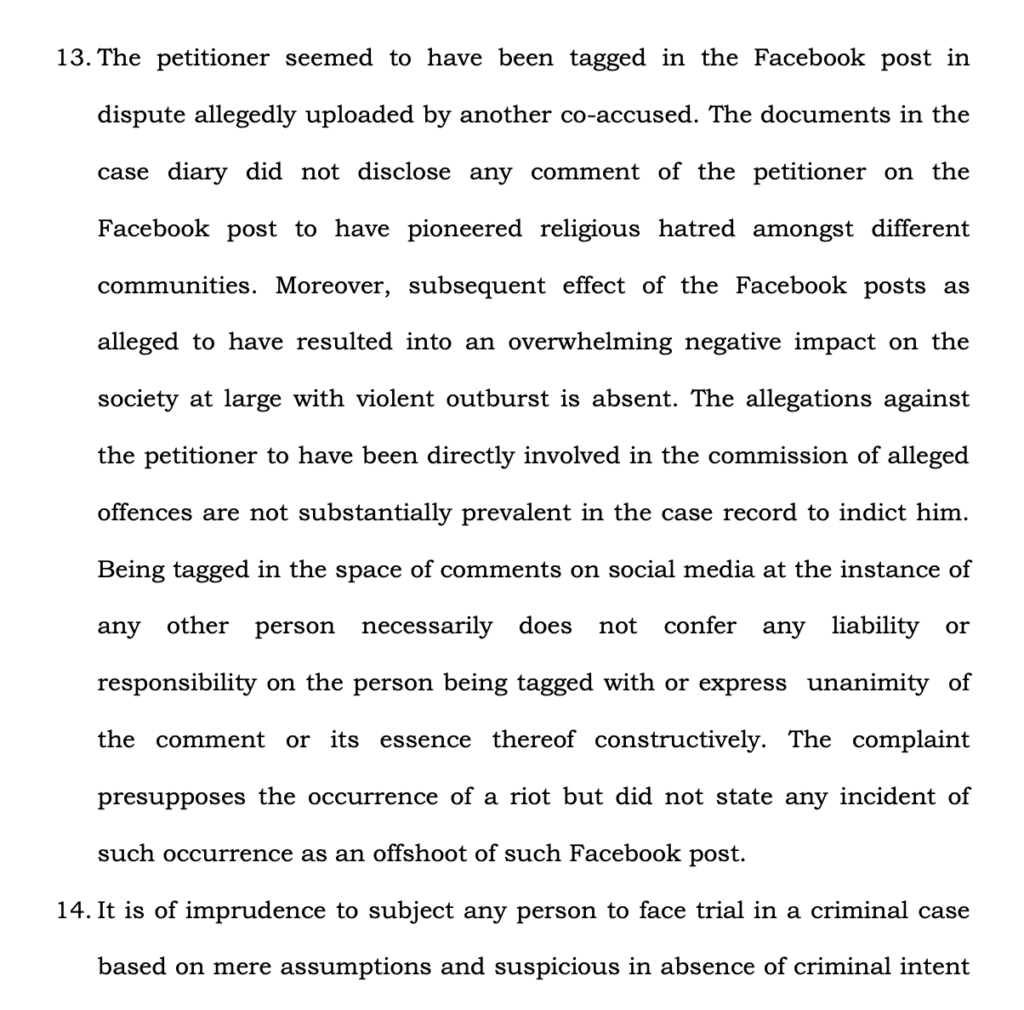In this week’s review of Court Judgments, we look at Delhi High Court’s observation regarding a plea of women seeking relaxation of UGC rules allowing for maternity leave, Madras High Court’s intervention to set aside a conviction without proper identification, Bombay high court upholding a case of culpable homicide, Patna High court’s ruling regarding seizure of vehicles due to non-payment and Calcutta’s High court’s ruling relating to fixing liability based on being tagged in a FB post.
Madras HC: Sets aside conviction in robbery case and states that punishment without proper identification directly impinges personal liberty.
The single Judge bench of Madras High Court consisting of Justice Anand Venkatesh has recently set aside a conviction in a robbery case and emphasized that punishing a person without proper identification will directly impinge the personal liberty guaranteed under Article 21 of the Constitution.
In the case, Vadivel and other vs. State, Vadivel, Vetrivel & Gurudev (appellants) were charged with offence of robbery. The prosecution alleged that these appellants have gone to the house of the complainant and threw chilli powder in her eyes. They took away her gold chain weighing 4 pounds. The FIR was registered against unknown persons and later the accused were arrested.
Looking into the case, the court noted that while registering the complaint, the defendant has not identified any of the accused by name. Further, there was no test identification parade conducted as part of the investigation. All through the process of the trial, the defendant has not identified any of the accused.
The court further noted that none of those living in the locality had identified the accused in the court. The only crucial witness of the case were the members of the co-operative bank where the gold chain was pledged. However, this would help only to the extent of recovery of the stolen item but not enough for conviction.
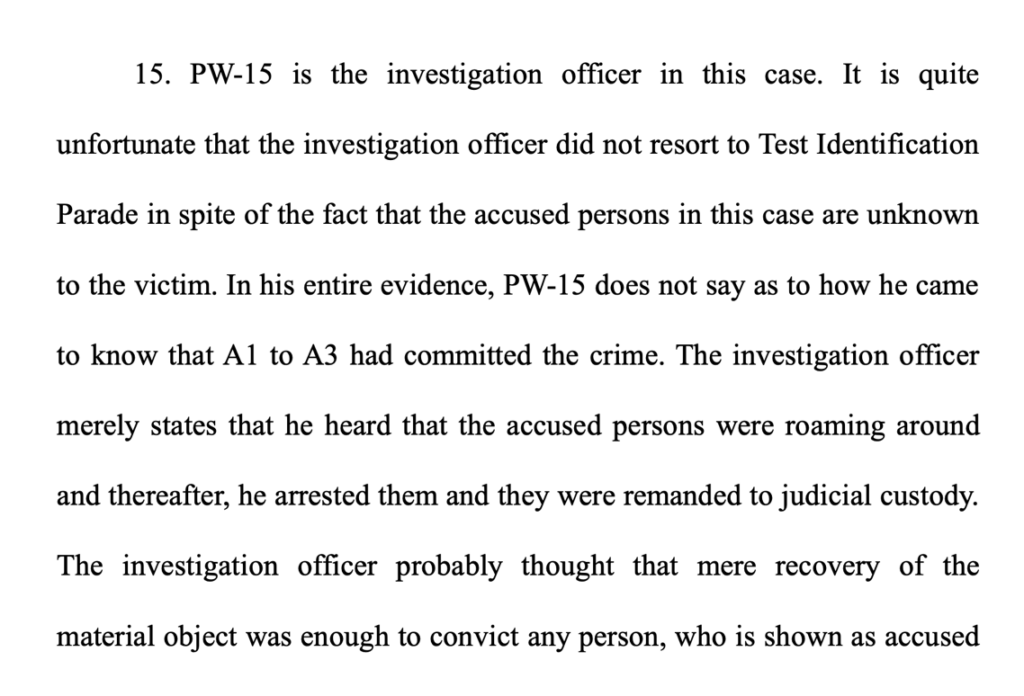
The judge commented that in many cases, the police officers usually show a habitual criminal as the accused. However, this is against the line of investigation. It was further emphasised that this would cause a dent in the criminal justice system. Based on these observations, the High Court felt that it was fit to intervene in the sentence of the trial court and set aside the conviction.
Delhi HC: Observed that Women can’t be forced to choose between right to education and reproductive autonomy.
Delhi High Court observed that women cannot be forced to choose between their right to education and right to exercise reproductive autonomy. It made this observation in the case, Renuka vs. University Grants Commission and Anr and proceeded to grant relief to a female candidate seeking relaxation of her attendance for completing a Master of Education (M.Ed) course, after being denied maternity leave.
In this case, the court was hearing the plea of a woman seeking directions on UGC to frame specific rules and regulations for the grant of maternity leave for post-graduate and undergraduate courses. She was enrolled in December 2011, for a two-year M. Ed regular course. An application for maternity leave was filed with the concerned Dean and Vice-chancellor of the University. This was rejected.
Looking into the case, Delhi High Court noted that while it cannot create a different compartment for the purpose of relaxation of attendance, it ought to find a balance between catering to the interests of candidates seeking maternity leave and also ensuring the application of regulations that require a specific number of days of attendance.
It noted that in various earlier judgments, the right of women to avail the benefit of maternity leave in the workplace is treated as an integral aspect of the right to live with dignity under Article 21 of the Constitution.
It stated that the court and the society have two roads to follow in such cases – either the bare text of existing legal provision be blind to consequences or be sensitive to the person and apply the constitutional values. The former would force a woman to choose between higher education and the right of becoming a mother.
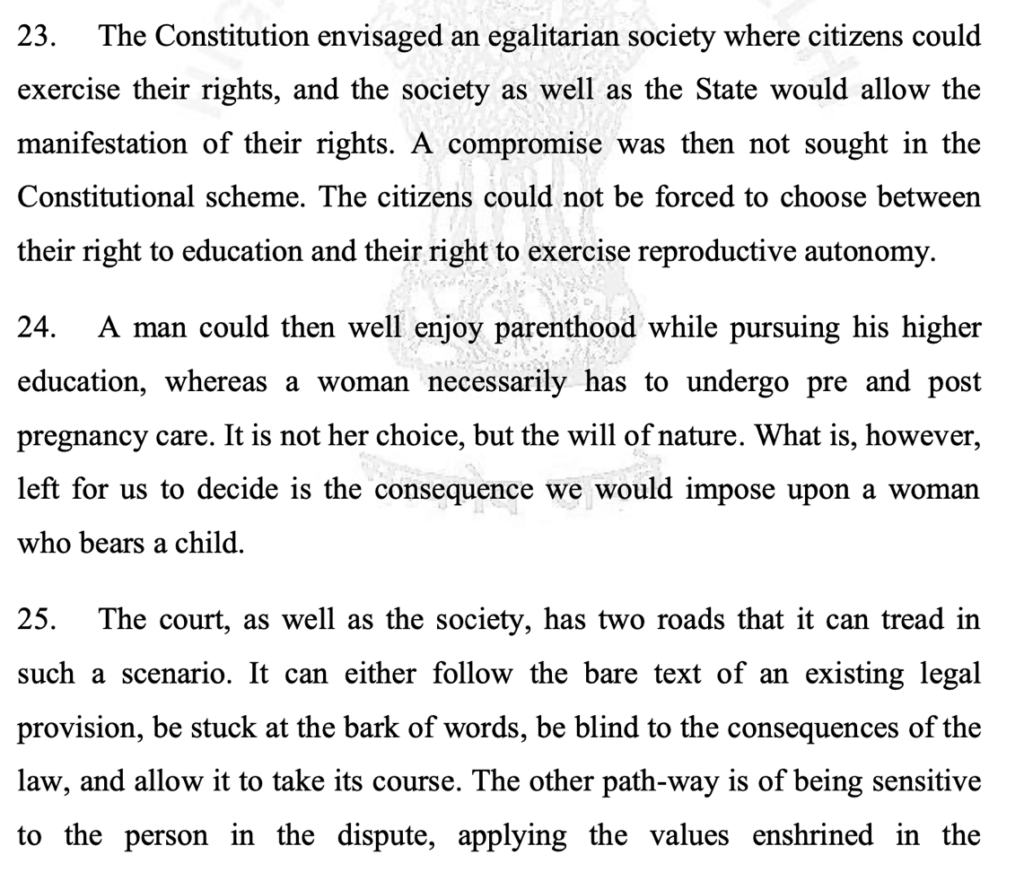
It set aside the decision of the varsity’s Dean and Vice-Chancellor. It instructed that if the petitioner fulfils the minimum 80% attendance criteria in the theory classes, after accounting for the 59 days maternity leave, then appropriate steps need to be taken to allow the petitioner to appear in the examination.
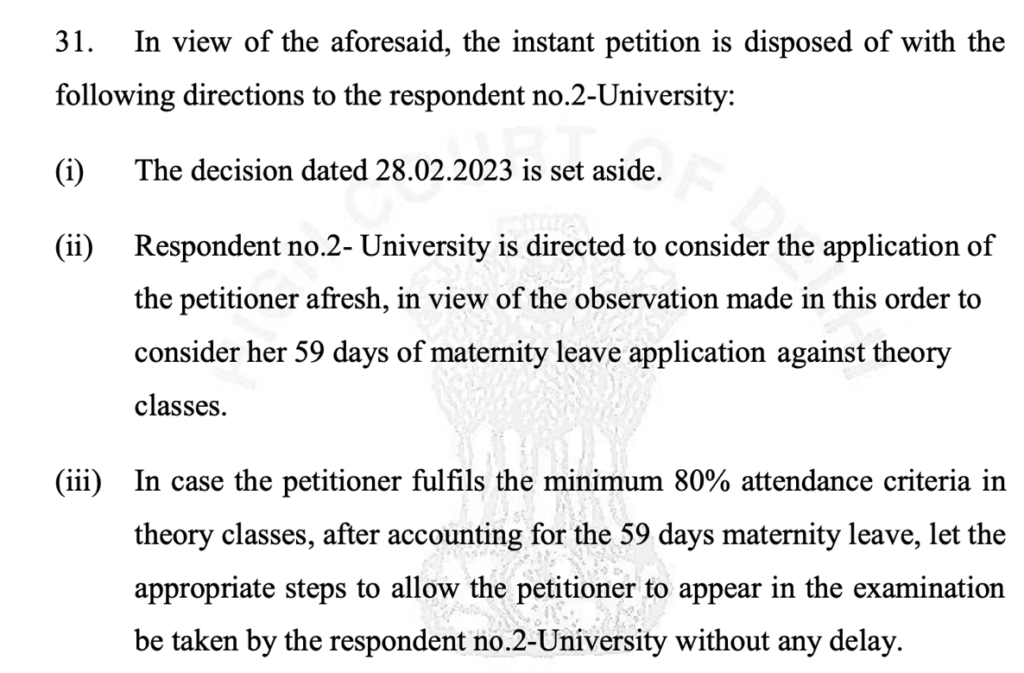
Bombay HC: Upholds culpable homicide charge against contractors over exposed vertical iron bars that lead to worker’s death.
In the case, Pinkesh Dhiraj Patel and Anr vs. State of Maharashtra, the Bombay High Court refused to quash a culpable homicide case against two sub-contractors of a construction site where a worker died after falling on exposed iron bars in an RCC column.
As per the case details, Amit Kumar Gound, a construction worker on a site in Goregaon, fell from a crane on open iron bars in an RCC column and died. His wife alleged that safety equipment – safety belt, helmet, safety jacket etc were not provided by the builder and contractor, and hence, they were responsible for his death.
Police filed an FIR with charges of culpable homicide against two sub-contractors. One of the sub-contractors was granted anticipatory bail. The case was committed to Sessions court for trial for culpable homicide not amounting to murder.
The accused approached the High Court seeking to quash the case. The argument presented was that there was no intention to cause death and that the incident was classified as an accident by the Labour commissioner. Hence, it is not a case of culpable homicide not amounting to murder.
The State submitted that leaving exposed vertical iron bars in the column led to his death. The court looked into the allegations and pointed out that a part of the allegations relates to the gross negligence in performing the duty.
The court agreed with the petitioners that as far as the act of omission is concerned, the offence of culpable homicide will not hold. However, having the knowledge that the act could result in the cause of death amounts to culpable homicide.
It observed that in this case there is an overt act on part of the accused in leaving dangerously exposed iron bars embedded in the RCC column at the construction site. They further had the prima facie knowledge that leaving the bars exposed could lead to a disaster.
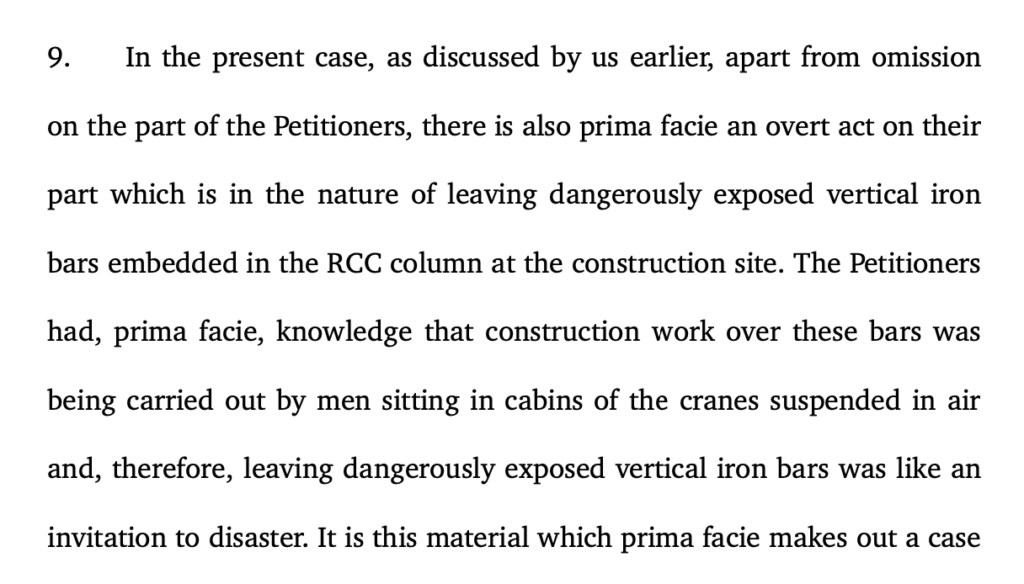
Patna HC: Ruled that forceful seizure of vehicles by recovery agents is unconstitutional and illegal.
Single judge bench of Patna High Court, consisting of Justice Rajeev Ranjan Prasad passed a ruling that banks and finance companies cannot use recovery agents to forcefully seize vehicles of customers who have defaulted on car loans, without following the due process.
The court was disposing a batch of pleas filed against the action of various contesting respondents – Tata Motor Finance Limited, IndusInd Bank Limited, Shri Ram Finance Company, ICICI Bank, and the State Bank of India.
The grievance of the petitioners was that their vehicles were forcibly seized by the respective banks & financial institutions without taking recourse to the process of law and by using goons during odd hours. Through the writ applications, the petitioners sought a direction to these institutions to hand over their respective vehicles with all the papers. They also sought compensation for the loss of reputation suffered by them.
The court observed that the act of the respondents was in clear contravention of the law. It emphasised that the banks and financial institutions can exercise their rights to recover loans within the limits of the Constitution. Even RBI guidelines emphasize that repossessions clause in the contracts ought to be legally valid and should comply with the provisions of the Indian Contracts Act.
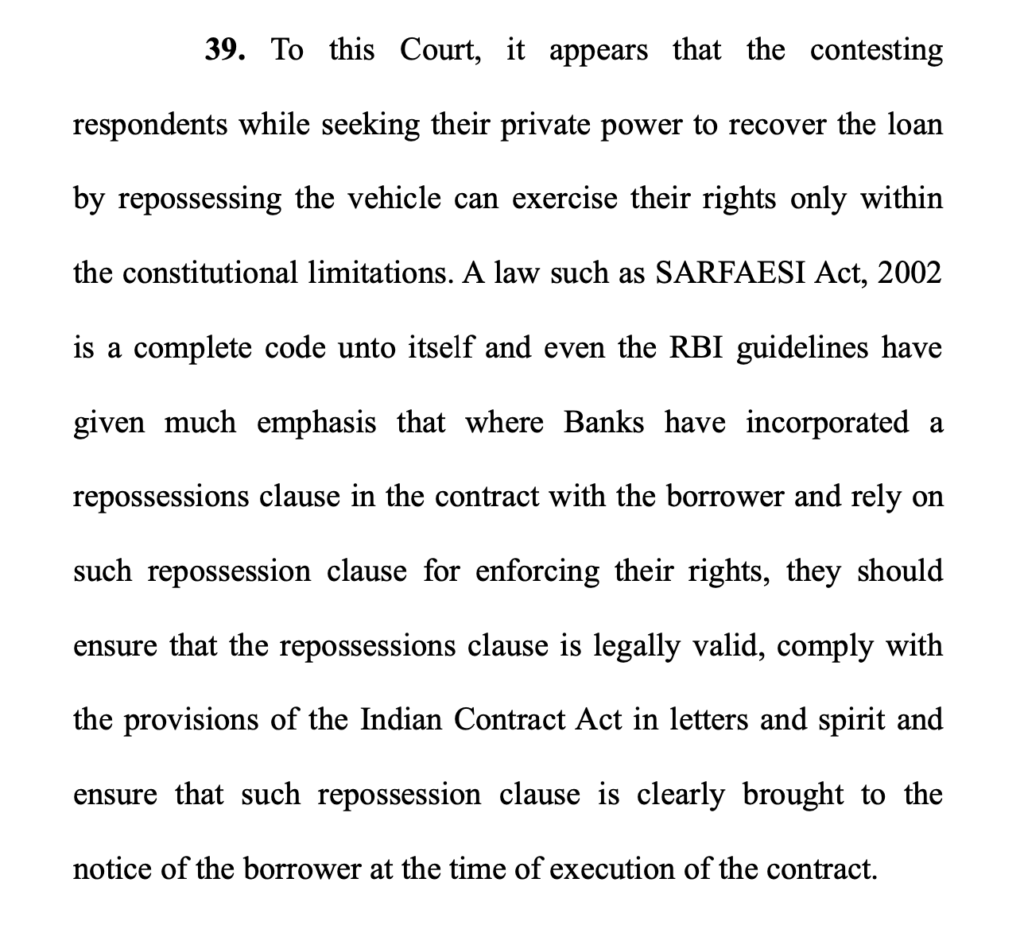
The court asserted that the Banks and Financial Companies have a constitutional obligation to not act in violation of law. Their act of repossession of vehicles without following RBI guidelines and the laws was wholly illegal and it further deprives the petitioners of their fundamental rights of livelihood and the right to live with dignity.
It directed the respondents to exercise their power to seize and repossess the vehicle only in accordance with the provisions of the SARFAESI Act, 2002 and the Rules framed under RBI guidelines.
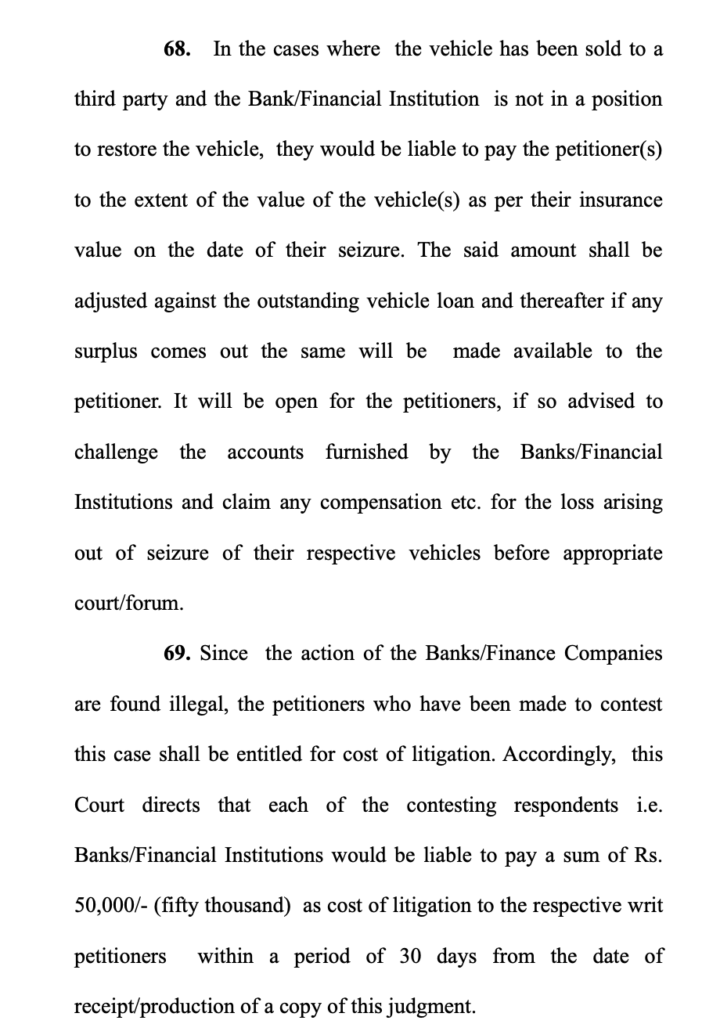
Calcutta HC: Ruled that being tagged in comments on Social Media by any other person necessarily does not confer any liability
As per the details of the case , Sri Protip Roy Basunia vs. The State of West Bengal, a complaint was filed by the complainant, based on which a case was registered against the petitioner and others with the allegation of spreading communal hatred and violence amongst the people of society through comments on Facebook profiles for certain persons.
Case was filed under Section 504 (Intentional insult with intent to provoke breach of the peace), Section 505 (Statements creating or promoting enmity, hatred or ill-will between classes), Section 506 (Punishment for criminal intimidation) and Section 120B (Punishment of criminal conspiracy) of IPC.
The petitioner approached the High court to quash the proceedings and submitted that he has been falsely implicated due to rival political ideologies and ulterior motives. Submission was also made stating that the allegations in FIR does not disclose any cognizable offence which would justify an investigation by the police.
The petitioner also contended that the alleged social media post was uploaded by another person and that he was merely tagged in the post, due to which it appears on his Facebook profile. It was submitted that he is neither the creator of the post nor had any intention to spew any religious hatred.
However, the counsel appearing on behalf of the State submitted that any material which could implicate the petitioner would be identified as part of the trial and that it is still at a premature stage and requested not to quash the proceedings.
The court noted that the complaint does not identify any specific act which would justify the offence that attracts these sections of IPC. Further, there is no occurrence of any riot which could be linked to this FB post. Based on the available details, the court ruled that being tagged in comments on social media by any other person does not necessarily confer any liability or responsibility on the person tagged. It proceeded to quash the criminal proceedings against the petitioner.
